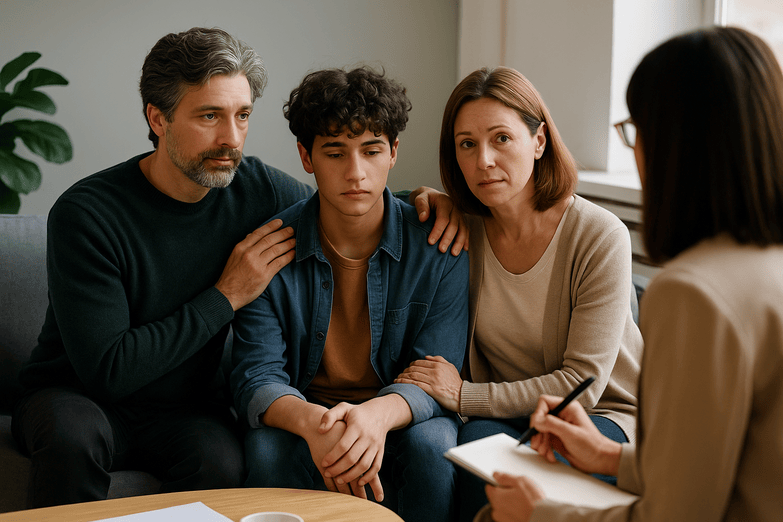Emotional habits, beliefs, and coping mechanisms often pass silently from one generation to the next. While many of these patterns help families stay close and resilient, others may carry unspoken pain — creating challenges that resurface in relationships, parenting, and self-esteem. Understanding how these patterns form and how to change them is at the heart of intergenerational healing, and it’s something that Thinking Families Counselling works to address with compassion and skill.
Families looking to transform deep-seated emotional patterns often turn to trusted Brisbane counselling at Thinking Families for guidance. The process is about more than therapy sessions; it’s about recognizing inherited behaviors and learning how to replace them with understanding, patience, and healthy connection.
Understanding Intergenerational Trauma
Intergenerational trauma refers to emotional wounds passed down through families — not necessarily through genetics, but through learned behaviors and unspoken communication. When a parent struggles with stress, loss, or emotional repression, these coping mechanisms can unconsciously shape how their children view relationships, safety, and love.
For example, a family that avoids discussing conflict might produce generations of individuals who find it difficult to express emotions. Another might pass down perfectionism or fear of failure as a means of gaining approval. While these patterns often start as survival strategies, they can later limit personal and emotional growth.
Therapists emphasize that identifying these patterns is not about blame, but awareness. Recognizing what has been carried forward allows people to choose differently for themselves and their families — a principle central to the approach at Thinking Families Counselling.
For readers interested in similar topics, you may find additional insight through related discussions on mental health awareness and self-reflection, which explore emotional wellbeing and resilience in daily life.
Recognizing the Signs of Generational Patterns
Many people don’t realize they are repeating family patterns until they begin noticing cycles in their relationships or emotions. These may include:
- Constant conflict or avoidance when discussing sensitive issues
- Feelings of guilt, fear, or shame without clear cause
- Difficulty trusting others or forming lasting connections
- A strong need for control or perfection in family life
If several generations share similar experiences — such as strained communication, unexpressed grief, or emotional withdrawal — it may point to a repeating dynamic that counselling can help to break.
At Thinking Families Counselling, therapists provide a space for reflection and honest dialogue. Clients are encouraged to notice patterns, share stories, and recognize how the past influences the present. Over time, this process allows individuals and families to replace reactive habits with intentional responses rooted in empathy and understanding.
How Counselling Helps Break the Cycle
Healing intergenerational trauma involves both insight and action. Counsellors use structured approaches such as family systems therapy and emotion-focused techniques to help clients understand the “why” behind their behaviors. This allows families to shift from reacting emotionally to responding thoughtfully.
During sessions, clients may explore:
- Patterns of communication – noticing how tone, silence, or avoidance influence relationships.
- Emotional triggers – identifying when feelings from the past affect current reactions.
- Reframing beliefs – questioning long-held assumptions such as “we don’t talk about feelings” or “asking for help is weak.”
What makes this process effective is its collaborative nature. Families are supported to rewrite narratives, rediscover compassion, and practice new ways of relating that align with their values today.
For anyone navigating long-term conflict or emotional disconnection, trusted Brisbane counselling at Thinking Families offers structured guidance and emotional support. Their approach centres on healing relationships, promoting self-awareness, and building a sense of hope across generations.
If you’re exploring ways to foster emotional growth at home, you may also like this article on communication in families, which discusses practical methods for improving understanding and trust.
The Ripple Effect of Healing
Breaking intergenerational patterns doesn’t just transform immediate relationships — it influences the generations to come. When one person learns to express emotions honestly or set healthy boundaries, that change can inspire children, siblings, and partners to follow. Over time, families begin communicating differently, showing more empathy, and reducing conflict.
Counselling plays a key role in this transformation by offering the tools and language needed to navigate emotions in healthier ways. Clients often report improved self-esteem, closer connections, and reduced stress. More importantly, they gain a sense of empowerment, knowing that change is possible regardless of how long the pattern has existed.
In many ways, seeking help becomes an act of love — both for oneself and for future generations. By choosing healing, families begin to create new traditions based on openness, care, and respect.
Real-Life Change: What Healing Looks Like
Consider a family where communication had always been tense and guarded. Parents and children avoided emotional conversations, leading to misunderstandings and resentment. Through consistent counselling sessions, they began exploring the root causes of their distance. The parents realized they had grown up in homes where emotions were dismissed, and they were unconsciously repeating that behavior.
With guidance from therapy, they learned to validate each other’s feelings and discuss issues without fear or judgement. Over time, the family reported more laughter, fewer conflicts, and a stronger sense of belonging. While their history hadn’t changed, their relationship with it had — and that shift made all the difference.
This kind of transformation is not instant, but it is lasting. As therapists often note, healing is a process built on patience and practice. Each conversation, each moment of self-awareness, adds to a new story — one rooted in empathy instead of inherited pain.
The Legacy of Emotional Health
Breaking the cycle of intergenerational trauma is one of the most powerful steps a family can take toward lasting wellbeing. It requires courage to look inward and compassion to move forward differently. Counselling provides the structure and support needed to sustain that journey.
The work done through Thinking Families Counselling demonstrates how deeply change can ripple across relationships, households, and communities. Every generation that chooses awareness over avoidance, and communication over silence, sets the stage for healthier futures.
Through trusted Brisbane counselling at Thinking Families, families are not just healing wounds — they are building new legacies defined by understanding, balance, and trust.



